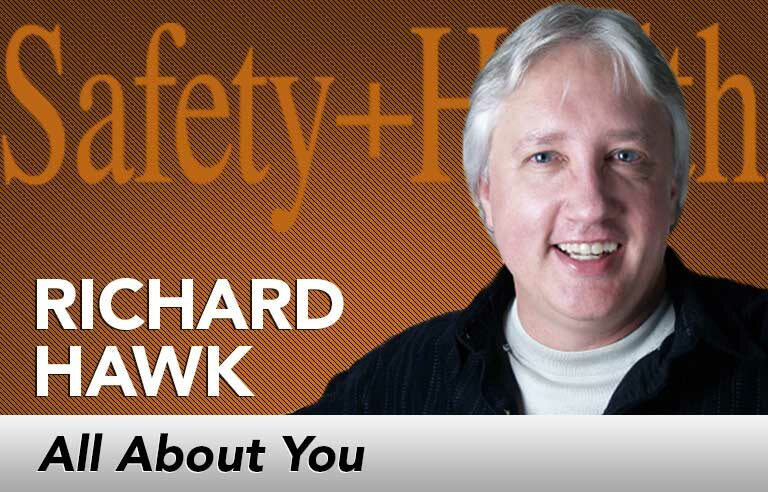All About You: No shame in asking for help

EDITOR’S NOTE: Motivating employees to work safely is part of the safety professional’s job. But who motivates the motivator? In this monthly column, veteran safety pro and professional speaker Richard Hawk offers his entertaining brand of wisdom to inspire safety pros to perform at their best.
Asking for help can be difficult. It can feel like you’re proclaiming, “I can’t do this on my own, even though I thought I could” or “I’ve made a mistake and need someone to help me fix what I’ve messed up!”
I know I haven’t asked for help on many occasions when asking was the only reasonable thing to do, because of how uncomfortable it felt to reach out and say, “This is more than I can handle.” There’s no shame in needing help; the opposite is true. Let’s say you as a safety and health professional get assigned to a construction project that includes work you have little or no experience overseeing. You certainly could fake it and act as though you know what’s going on. I’ve seen this happen more than a few times. It rarely turns out well and can damage your credibility for a bit. What does work? Admitting your lack of experience and knowledge, and then candidly asking for help.
I met a young woman – we’ll call her “Sarah” – who was just out of college with a safety and health degree. During a break at one of my professional development seminars, she confided with me that she, for a while, had trouble getting the experienced employees at the refinery where she worked to take her seriously. She then said she didn’t have this problem anymore. I was intrigued. “What did you do to solve it?” I asked. She replied, “I got advice from one of the senior mechanics who I knew before I started working at the site.” She asked him what he thought she should do to gain more respect.
What makes this story special isn’t the advice the senior mechanic gave Sarah, but how he told the other mechanics that he thought Sarah (despite her being younger than some of the other mechanics’ daughters) knew what she was doing and they should show her respect and listen to her. She told me it was incredible how much of a difference his influence made on her ability to perform her job and feel more comfortable around the mechanics.
Overcoming reluctance
I’m not sure why I’m reluctant to ask for help. Perhaps it’s a perception I have of myself as someone who’s always in control. Thankfully, I’m getting better at asking for help, mostly because I’ve come to realize it’s not a sign of weakness or ineptitude.
All of us, no matter how “brilliant,” still have a limited amount of ability. Even if you’re a top expert in your field, there still will be times when you need assistance from another source. Here’s one of my favorite witticisms from the famous 19th century entertainer, humorist and author Will Rogers: “Everyone is ignorant, only on different subjects.”
Pride can stop us from asking for help, but sometimes it’s because we don’t want to inconvenience anyone. Consider this: I like to help others. I’m sure you do, too. Plenty of research shows that altruistic activities feel good and are a strong happiness factor. Yet, too often, we don’t give others a chance to experience those happiness boosts by letting them help us.
Needing help with personal matters isn’t a character flaw. Every person, even with best efforts, can fall into a tough situation because of life circumstances or misjudgment. Realizing we’re in a condition that we can only get out of with help shows wisdom and humility, provided we don’t hold back from reaching out.
Because we’re on the subject, I’d like to ask for your help. This is my seventh year being a columnist for Safety+Health. Do you have any suggestions on topics you’d like me to write about or other tips on ways to improve “All About You”? I want to make sure the column is helping you as a safety and health professional. You can make comments online or email me at [email protected].
This article represents the views of the author and should not be construed as a National Safety Council endorsement.
Richard Hawk helps safety professionals become better leaders through his keynotes, workshops, articles and books so they can create vibrant safety cultures. His popular “Mindfully Safe” keynote teaches employees how to focus better and improve their situational awareness, a key skill to preventing incidents. To contact Richard, visit makesafetyfun.com.
Direct to your inbox: Sign up to be notified in email about new "All About You" columns.
Listen on Soundcloud or Stitcher
Post a comment to this article
Safety+Health welcomes comments that promote respectful dialogue. Please stay on topic. Comments that contain personal attacks, profanity or abusive language – or those aggressively promoting products or services – will be removed. We reserve the right to determine which comments violate our comment policy. (Anonymous comments are welcome; merely skip the “name” field in the comment box. An email address is required but will not be included with your comment.)

